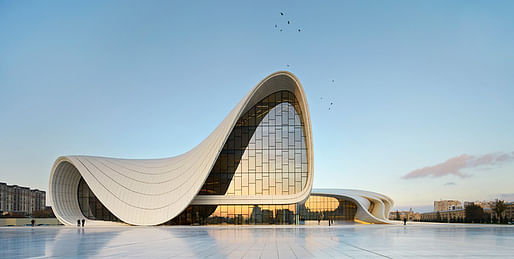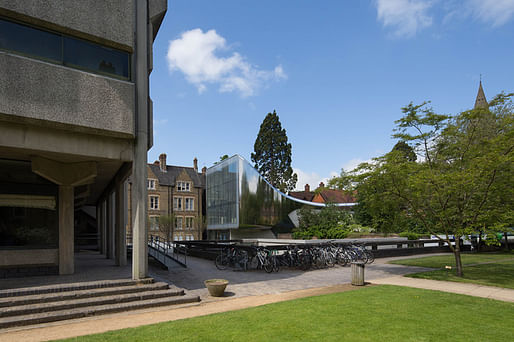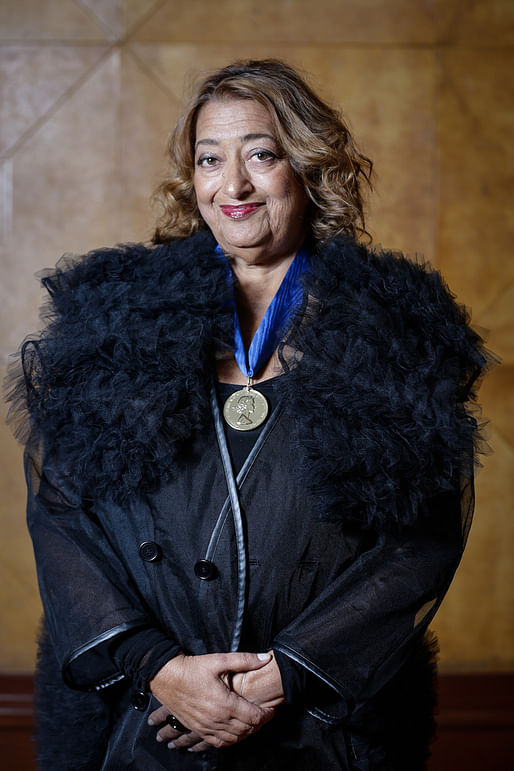
What was it like to be Zaha Hadid? From teaching to developing her vision to turning down an opportunity to work with Rem Koolhaas, in this remembrance we collect a few of Zaha's first-person writings and interviews about her life and work from her unparalleled, groundbreaking career.
On being a woman and an Arab, excerpted from The Guardian, 2012:
Being an Arab woman and a modern architect certainly don't exclude each other – when I was growing up in Iraq, there were many women architects. You cannot believe the enormous resistance I've faced just for being an Arab, and a woman on top of that. It is like a double-edged sword. The moment my woman-ness is accepted, the Arab-ness seems to become a problem.
I've broken beyond the barrier, but it's been a very long struggle. It's made me tougher and more precise – and maybe this is reflected in my architecture. I still experience resistance but I think this keeps you on the go.
As a woman in architecture, you need confidence. Sometimes, women feel they have to do everything - work, manage the house, look after the children - but there's too much to do. So you have to learn early on that you can't do everything yourself, and you have to learn to trust other people to work on your vision. Teamwork is very important to me, and that's why things are manageable. I can't take credit for my projects alone - many people in my office have contributed to them. [...]

Ultimately, architecture is all about wellbeing; the creation of pleasant and stimulating settings for all aspects of life. Part of architecture's job is to make people feel good in the spaces where we live, where we go to school or where we work.
I am equally proud of all of my architectural projects. It's always rewarding to see an ambitious design become reality. But what is really exciting is that no matter how long you work on a project, no matter how often you draw and redraw a building, there are always moments that are completely unexpected. With each new project I always feel a real sense of discovery; a truly original and uplifting experience.
On how abstraction helped her develop her style, from The New Yorker, 2009:
“Abstraction opened the possibility of unfettered invention,” Hadid said in her Pritzker [Prize] address. When [John Seabrook] asked her to explain how, she said that abstraction gave her a way to study how lines intersect. When she drew, she said, “I wanted to capture a line, and the way a line changes and distorts when you try to follow it through a building, as it passes through regions of light and shadow. You know when you look through a building from a window on the outside, and the line you are following is distorted by the space? That was what I was trying to see with my paintings and my whooshings.”

On austerity in low-income housing, excerpted from The Guardian, 2012:
"I think that [austerity] is used as a cliche because people don't have ideas, they want to crib [old ones] to do bad stuff," she said, in a Q and A session with Guardian deputy editor Kath Viner. "Schools, housing, hospitals – I think the government should invest in good housing."
She added that the skyline of many of the UK's cities were "made horrible" by developments in the 1960s because they government "wanted to be cheap".
"There needs to be investment. We need some sort of quality," Hadid said. "All the privileged can travel, see different worlds, not everyone can. I think it is important for people to have an interesting locale nearby. [Buildings] need to do another job, enlighten people, space enlightens the same way as music art and technology."

On teaching, from The Huffington Post, 2015:
I always thought teaching was very important. You learn from what you teach, and show people they can achieve beyond what they thought possible for them to do.
HP: What do you teach?
I don’t think you can teach architecture, you can only inspire people. In Vienna, it is called a masterclass, because you are a master and the students are with you for five or six years. At the end, the students have learned your repertoire and your expertise.

On diplomacy, from The Huffington Post, 2015:
Diplomacy! Not my best talent! I don’t play up to people. I remember Rem Koolhaas when they asked me to join OMA, and I said, “Only as a partner.” I mean, honestly! I had just finished school. And they said, “As long as you are an obedient partner.” I said, “No, I am not going to be an obedient partner.” That was the end of my partnership!
Finally, on the reality of being a female architect, from Fresh Air with Terry Gross, 2004:
If I went to a meeting with even an assistant of mine, to the side they will talk to him and not talk to me. I mean, there's a world which you, as a woman, no matter how successful you are, you can't enter into. You are not part of a network.
It takes you a long time, let's say, to come over these things. I mean, I never thought it'd be a problem because ... for good reason or bad reason, I always thought, you know, I should do well because the work is good.

No Comments
Block this user
Are you sure you want to block this user and hide all related comments throughout the site?
Archinect
This is your first comment on Archinect. Your comment will be visible once approved.